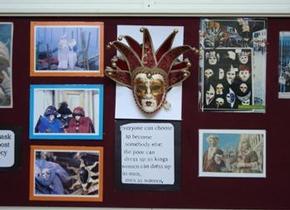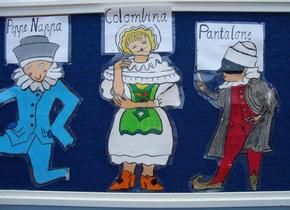At St. Peter’s, we value the importance of students learning a Language Other Than English (LOTE). The LOTE lessons are guided by the Victorian Curriculum Standards. The language currently offered across all year levels is Italian.
All Year Prep to Year 6 students at our school will study a sequential Languages (Italian) course based upon the content descriptions contained within the Victorian Curriculum.

 f
f
Aims
The teaching of Languages at our school is pitched to second language learners as the dominant group of learners of the Italian language in the Australian context.
- Students aim to develop communication skills and knowledge and come to understand social, historical, familial relationships and other aspects of the specific language and culture of Italy.
- Learners are also provided with the tools, through comparison and reflection, to understand language, culture and humanity in a broad sense.
- Language learning contributes to the development of inter culturally aware citizens, this being of increasing importance at a time of rapid and deep globalisation.
Year Prep to Year 2
- Students use Italian for social interactions such as greetings, asking and answering simple questions, responding to instructions, singing songs, and taking turns in games and simple shared tasks.
- The focus is on listening to the sounds, shapes and patterns of Italian through activities such as rhymes, songs, clapping and action games. Repetition and recycling help children to identify frequently used words and simple phrases, and to recognise the purpose and intention of simple texts.
- Through creative play and action-related talk, children begin to notice that language can behave differently in different situations and that Italian speakers communicate in some ways that are different from their own.
- Students are encouraged to notice that they are part of a connected world which includes many languages and cultures, and they begin to become aware of themselves as communicators in particular cultural contexts and communities.
Year 3 and Year 4
- Children develop active listening skills and respond through action-related talk.
- They strengthen their comprehension skills, using contextual and grammatical cues as well as phonic and non-verbal cues.
- Children are supported to use the language themselves in familiar contexts and situations, such as exchanging simple ideas and information, negotiating predictable activities and interactions, and participating in shared tasks, performance and play.
- They continue to build vocabulary which can be adapted for different purposes, and to control simple grammatical forms to communicate in familiar contexts.
- The contexts in which learners interact in using and learning Italian are primarily local: the classroom, school, home and community, with some access to wider communities of Italian speakers and resources through virtual and digital technologies.
Year 5 and Year 6
- They participate in shared tasks and purposeful language experiences as well as focusing explicitly on language structures and systems, literacy skills and cultural elements of communication.
- They learn skills in ‘reading’ language for cultural and contextual meaning. Individual and group oral-presentation and performance skills are developed through researching and organising information, rehearsing and resourcing the content of presentations, and selecting appropriate language to engage particular audiences.
- Learners use Italian with each other and the teacher for a range of purposes: exchanging information, expressing ideas and feelings, performing and responding to Italian texts and experiences.
- They use ICT to interact with each other and with peers, exchanging resources and information, accessing music and media resources, and contributing to class activities such as a blog or webpage.
Assessment
Students’ individual abilities will be measured and reported against the expected Victorian Curriculum achievement standards.
Samples of students work will be included in Learning Journeys twice a year – once each semester accompanied by teacher comments.
Students in years 3 to 6 will receive a mark on their school reports twice a year.